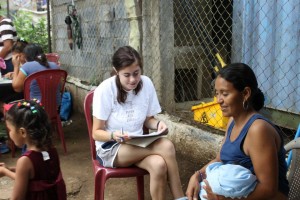Worried about how “time off” to travel may affect your career?
 by Perrin Bailey
by Perrin Bailey
“When will you be back?”
My boss’s wide eyes and raised brow fixed on me from across his broad desk.
“I’m not sure,” I confessed. “A year?”
In 2010, I quit my steady job planning media for Disney at a small agency, sold my furniture and packed an ungainly Kermit-green backpack. In this my 25th year, I ultimately made my way to 25 countries across four continents. This adventure became one of the most constructive and fulfilling things I’ve done.
My sister Sarah quit her hot marketing gig at HBO to join me on the road, and she thinks the trip was the best thing she’s ever done, too.
But what happened when we got back home to New York, you ask?
My former client referred me for an internal position at Disney Interactive, and HBO welcomed Sarah back. HBO even awarded Sarah the promotion she had passed up to travel.
Sounds lucky, huh? Perhaps. But we did follow a strategy not only to make the most of our time abroad, but also to ensure a successful landing at the end of our flight. Here are the four steps that worked for us and I offer to you:
- Seek Relevant Experience. I work in digital media and love journalism, so I auditioned for an online travel documentary to be produced by Jet Set Zero. With JSZ I learned about production and contributed to social media promotions, rounding out my skill set to become a “digital expert.” This while traveling Italy with most expenses paid. How did we find this gig? Networking.
Talk to everyone you know in your industry and attend as many local events as you can, in addition to researching opportunities directly. You never know what may come up!
- Pinpoint Your Passion. Did you discover new interests or develop existing ones while traveling? Great! Apply to jobs that relate. I’d become consumed with creating and consuming travel videos, so I applied to program YouTube’s new travel channel. It was the one time Google invited me to interview. (I wound up continuing my relationship with Disney, but both were stellar opportunities!)
- Present What You Learned. Reflect on the skills you developed on the road (e.g. negotiating, financial planning, resilience) and be able to articulate them in interviews. For a sampling of job-related skills you can gain on the road, please visit our blog, www.thesistersbailey.com. (Hint: One way to present your experience is to start a blog.)
- Do Memorable Work Before You Leave. If you tackle the tasks at hand, find ways to expand on your job description, and build strong relationships, clients and colleagues will remember you. If your former job does not have an opening upon your return, these skills and relationships will help you make a connection elsewhere.
Yes, quitting a good job to travel is a big risk. But it can be a big opportunity. So if you think you want to do it, think about how you can get the most from it . . . and go for it!
Perrin currently develops integrated marketing campaigns at Disney Interactive in New York City. For more travel and work tips from Perrin and her sister Sarah, please visit their blog www.TheSistersBailey.com.


